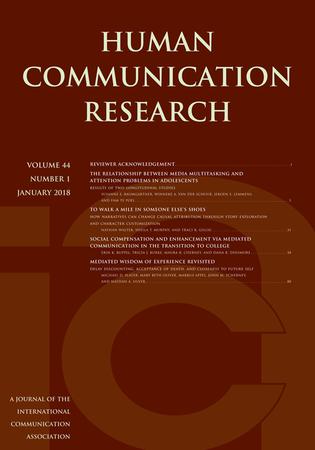不同性别的年轻人对临终话题的回避:使确认性别的临终对话正常化的重要性
IF 4.4
1区 文学
Q1 COMMUNICATION
引用次数: 1
摘要
这项定性访谈研究考察了新出现的跨性别和性别多样化成年人(TGD,18-20岁)在考虑与家人的临终对话(EOL)时所面临的挑战和障碍。虽然在跨性别群体中尚未正常化,但在一个观察到死后身份扭曲事件的人群中,确认性别的EOL对话至关重要。收集到的数据表明,大多数参与者都没有参与过这样的对话,许多人预计很难发起一场对话,而不是一个,而是两个传统的沟通禁忌:死亡和怪异。公开讨论面临的挑战包括群体身份因素,包括家庭的宗教信仰、文化规范和政治派别,以及对参与可能暗示即将死亡或自杀的讨论的犹豫。结果还表明,对更积极的对话结果的预期与参与回避行为的愿望降低是一致的。然而,对许多人来说,对于一个年轻人来说,与父母讨论自己的死亡太“奇怪”、“尴尬”或“苛刻”了。这种“尴尬”在整个美国文化中被认为是规范性的,但对TGD个人的影响是显著的。对于那些存在于主流性别二元之外的人,表明了性别肯定EOL的正常化,以使此类对话更容易进行、更有效、更不工作。本文章由计算机程序翻译,如有差异,请以英文原文为准。
End-of-life topic avoidance among gender-diverse young adults: the importance of normalizing gender-affirming end-of-life conversations
This qualitative interview study examines the perceived challenges and obstructions that emerging transgender and gender-diverse adults (TGD, ages 18–30 years) face when considering end-of-life conversations (EOL) with their family members. While not yet normalized in the trans community, gender-affirming EOL conversations are critically important in a population where episodes of postmortem identity distortion have been observed. Data collected suggest that most of the participants have not engaged in such conversations and that many anticipate difficulty initiating a conversation that includes not one, but two, traditional communication taboos: death and queerness. Among the challenges to open discourse were group identity factors including the family’s religious beliefs, cultural norms, and political affiliations, as well as hesitancies to enter into discussions that might suggest an impending death or suicide. Results also showed that the anticipation of a more positive conversational outcome was consistent with a reduced desire to participate in avoidance behavior. For many, however, it was simply considered too “weird,” “awkward,” or “harsh” for a young adult to discuss their own death with their parents. This “awkwardness” is considered normative throughout U.S. culture, but repercussions for TGD individuals are significant. For those who exist outside the mainstream gender binary, the normalization of gender-affirming EOL is indicated in order to make such conversations more accessible, effective, and nonawkward.
求助全文
通过发布文献求助,成功后即可免费获取论文全文。
去求助
来源期刊

Human Communication Research
COMMUNICATION-
CiteScore
8.20
自引率
2.00%
发文量
28
期刊介绍:
Human Communication Research is one of the official journals of the prestigious International Communication Association and concentrates on presenting the best empirical work in the area of human communication. It is a top-ranked communication studies journal and one of the top ten journals in the field of human communication. Major topic areas for the journal include language and social interaction, nonverbal communication, interpersonal communication, organizational communication and new technologies, mass communication, health communication, intercultural communication, and developmental issues in communication.
 求助内容:
求助内容: 应助结果提醒方式:
应助结果提醒方式:


